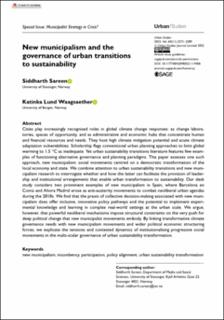| dc.contributor.author | Sareen, Siddharth | |
| dc.contributor.author | Wågsæther, Katinka Lund | |
| dc.date.accessioned | 2022-11-09T14:06:45Z | |
| dc.date.available | 2022-11-09T14:06:45Z | |
| dc.date.created | 2022-11-01T08:30:45Z | |
| dc.date.issued | 2023 | |
| dc.identifier.issn | 0042-0980 | |
| dc.identifier.uri | https://hdl.handle.net/11250/3030985 | |
| dc.description.abstract | Cities play increasingly recognised roles in global climate change responses: as change laboratories, spaces of opportunity, and as administrative and economic hubs that concentrate human and financial resources and needs. They host high climate mitigation potential and acute climate adaptation vulnerabilities. Scholarship flags conventional urban planning approaches to limit global warming to 1.5°C as inadequate. Yet urban sustainability transitions literature features few examples of functioning alternative governance and planning paradigms. This paper assesses one such approach, new municipalism: social movements centred on a democratic transformation of the local economy and state. We combine attention to urban sustainability transitions and new municipalism research to interrogate whether and how the latter can facilitate the provision of leadership and institutional arrangements that enable urban transformation to sustainability. Our desk study considers two prominent examples of new municipalism in Spain, where Barcelona en Comú and Ahora Madrid arose as anti-austerity movements to combat neoliberal urban agendas during the 2010s. We find that the praxis of collective decision-making associated with new municipalism does offer inclusive, innovative policy pathways and the potential to implement experimental knowledge and learning in complex real-world settings at the urban scale. We argue, however, that powerful neoliberal mechanisms impose structural constraints on the very push for deep political change that new municipalist movements embody. By linking transformative climate governance needs with new municipalism movements and wider political economic structuring forces, we explicate the tensions and contested dynamics of institutionalising progressive social movements in the multi-scalar governance of urban sustainability transformation. | en_US |
| dc.language.iso | eng | en_US |
| dc.publisher | Sage | en_US |
| dc.rights | Navngivelse-Ikkekommersiell 4.0 Internasjonal | * |
| dc.rights.uri | http://creativecommons.org/licenses/by-nc/4.0/deed.no | * |
| dc.title | New municipalism and the governance of urban transitions to sustainability | en_US |
| dc.type | Journal article | en_US |
| dc.type | Peer reviewed | en_US |
| dc.description.version | publishedVersion | en_US |
| dc.rights.holder | Copyright Urban Studies Journal Limited 2022 | en_US |
| cristin.ispublished | true | |
| cristin.fulltext | original | |
| cristin.qualitycode | 2 | |
| dc.identifier.doi | 10.1177/00420980221114968 | |
| dc.identifier.cristin | 2067117 | |
| dc.source.journal | Urban Studies | en_US |
| dc.source.pagenumber | 2271-2289 | |
| dc.identifier.citation | Urban Studies. 2023, 60 (11), 2271-2289. | en_US |
| dc.source.volume | 60 | |
| dc.source.issue | 11 | |

